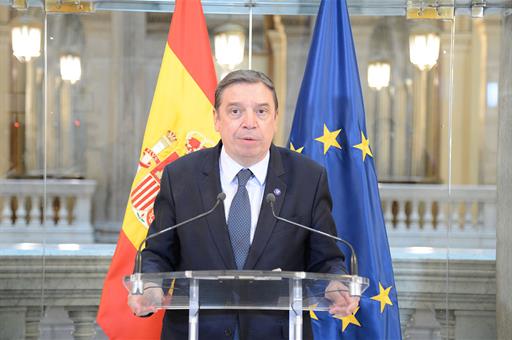Planas: The adoption of multiannual quotas will allow better planning for fishing enterprises and give the sector stability
News - 2023.11.27
At the meeting, with representatives of the Spanish Fisheries Confederation (Cepesca) and the National Federation of Fishermen's Guilds (FNCP), the minister pointed out that Spain's impetus has enabled measures to be adopted within the EU to improve the decision-making procedure on fishing quotas. This has brought forward much of the preparatory work for the Council of Ministers, which each December sets the allowable catches for the following year.
This is the first of a series of meetings the minister will hold in the coming weeks with representatives of the agricultural and fisheries sectors and with the autonomous communities to exchange points of view on the new legislature. "Our aim is to maintain dialogue, communication and the exchange of ideas and proposals to manage Spain's interests in a more positive way," the minister said.
Planas pointed out that the Spanish initiative on changes to the procedure for setting TACs and quotas has been very well received by the member states and that, as a result, a great deal of technical work is being carried out in these weeks in preparation for the Council of Ministers to be held in Brussels between 10 and 12 December. "It is a very complex negotiation involving very broad populations and sectors," said the minister, who pointed out that for the first time the Council will begin with a compromise proposal from the Presidency-in-Office.
The European Commission has already agreed to set TACs and multi-annual quotas this year for different species (plaice, whiting, pollack, Norway lobster and sole) in nine fishing areas. The minister stressed that with these advances, Spain will leave its mark on the Council, expressing his confidence that these improvements will have a positive impact on the functioning of the Community fisheries sector.
According to Planas, this is a very important step, the beginning of a process that in the coming years should be extended to other species where possible, depending on the scientific studies available on the situation of stocks and fishing grounds, and on the recommendations these studies will produce.
The minister informed Cepesca and FNCP about the current situation of Spanish interests in the negotiations prior to this Council of Ministers, stressing that in the case of the Atlantic he expects significant improvements for some of the stocks in Iberian waters of most interest to the Spanish fleet, such as hake and southern horse mackerel, monkfish and megrim.
As for the Mediterranean, the minister assured that Spain will try to avoid or limit as much as possible the new reduction in fishing days proposed by the Commission. The Government of Spain is committed to other measures such as the selectivity of fishing gear and the strengthening of the compensation mechanism to ensure that the objectives of the multiannual management plan for the Mediterranean are met in a balanced and progressive manner, said the minister.
Luis Planas also detailed the agreement in principle between the EU and the UK announced by the Commission five days ago, with good results for Spanish interests, as well as the 25% increase in the albacore quota achieved at the Council of the International Commission for the Conservation of Atlantic Tunas (ICCAT), held last week. He also highlighted the results on fishing opportunities for the Spanish fleet in the North Atlantic (NAFO) and Northwest Atlantic (NEAFC).
The meeting reviewed the network of bilateral agreements between the EU and third countries, from which Spain is the country that benefits most because it is the one that obtains the largest number of licences, especially on the African and Pacific coasts. The most important of these, Mauritania, is scheduled to hold a joint monitoring committee in the first week of December.
In the coming months, progress should be made on the renewals of the protocols with Cape Verde, Guinea Bissau, Côte d'Ivoire, Senegal and Sao Tome and Principe, which expire in 2024. The minister also informed that Spain has asked the EU to conclude two new agreements with Angola and the Republic of Guinea, for which the corresponding prior evaluations have already been carried out.
At the meeting with the two fisheries organisations, the minister also took stock of the objectives of the Spanish presidency of the EU, which ends in a month's time. He stressed that the informal meeting of ministers held in July in Vigo had made it possible to agree on the need to define a common strategy on the decarbonisation and renewal of the fleet, and to improve the training of shipowners, crew and fish farmers, on which the Community bodies are already working. The Vigo meeting also opened the debate on the need to make new EU funds available outside the current European Maritime Fund for Fisheries and Aquaculture (EMFF) to tackle this renewal process.
The minister also highlighted the path opened up by the Spanish presidency on the recognition of the importance of fishery products for food security, with the aim of ensuring that they have an adequate presence in people's diet and that there is respect for common rules so that fishing fleets compete on equal terms in all seas (level playing field). This line of work, which was set out at the meeting of the Directors-General for Fisheries held in Malaga in September, will be continued under the Belgian presidency, which begins on 1 January 2024, as it has made it one of its priorities.
Non official translation





